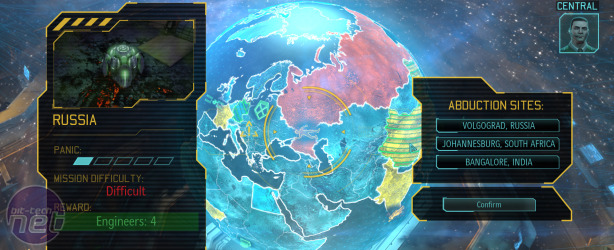
XCOM: Enemy Unknown Review
Platform: PC, Xbox 360, PS3Publisher: 2K Games
UK Price (as reviewed): £29.99 Incl. VAT
US Price (as reviewed): $59.99 Excl. Tax
Appearances can be deceiving, sometimes annoyingly so. If you looked at XCOM: Enemy Unknown and judged it solely by the screenshots or trailers, for example, you'd probably assume that it's a watered down and console-centric game. With those cartoony graphics and that super-chunky UI that highlights every possible cover point with a holographic shield, it bears all the hallmarks of a too-easy, too-simple babygame.
Look deeper though and you'll see that's not the case - XCOM may have moved in a new direction stylistically, but that's just a colourful veneer. Underneath it's the same game as ever; uniquely punishing and strangely emotional for a game that doesn't really have any proper characters.
Functionally it's the same too, acting as a reboot for the entire XCOM series. You're cast as a nameless commander for a new anti-alien taskforce assembled by the shadowy Council of Nations and it's your role to investigate and repel an alien invasion. To this end you're given a base, a squad of soldiers and a monthly budget numbering in the millions - but from there you're on your own.
Like any decent story-led strategy game, XCOM is at it's best when it's giving you clear objectives to work towards, but lets you decide how you'll get there. After the (too) lengthy tutorial you're given a breadcrumb of initial goals, such as breaching an enemy base and attacking a downed UFO, but you're allowed a flexibility as to how you accomplish that.
Will you kill your opponents or try to capture them alive, for interrogation? Will you prioritise building a diverse attack force or a small team of specialists? Use salvaged alien materials for research or engineering? Which continents are expendable and which are critical? These are the sorts of decisions XCOM focuses around on the grand scale, punctuating them with the same turn-based, grid-based combat that the series is known for.
And, of course, because there are so many decisions to make and there's so much randomness worked into the systems, it becomes impossible to play XCOM perfectly. From the moment the campaign starts you're constantly on the back foot, racing to catch up to a technologically superior foe that can strike anywhere, at any time - and when you fluff up then the punishments are fantastically severe. Often all that stands between the life and perma-death of a soldier you've built up for countless hours is the roll of a virtual die.
It's hard to articulate exactly why that's so enjoyable - it's something about the risk/reward relationship and the thrill of the chase, rather than our masochistic nature - but it's enough for now to say that it is. XCOM may be challenging to the point of occasional cruelty, but it's always a fair simulation - one that pushes you to rise to its level, rather than simplifying itself to suit all audiences. Games are better that way.

MSI MPG Velox 100R Chassis Review
October 14 2021 | 15:04











Want to comment? Please log in.